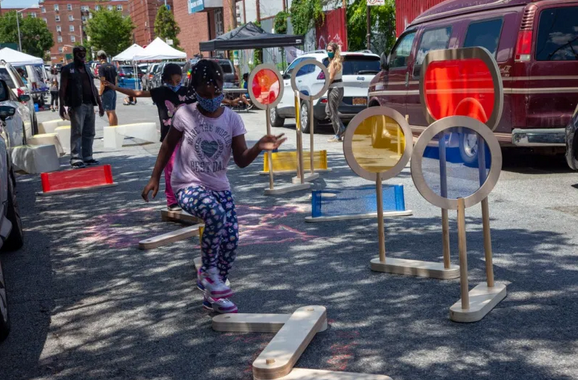In the fight to end systemic racism in our cities and the fight to keep our communities strong during COVID-19 pandemic, our streets are a uniquely precious resource — and 10 U.S. communities are getting a little help to put their roads to the highest and best use.
The National Association of City Transportation Officials (NACTO) has announced the winners of the Streets for Pandemic Response and Recovery Grant Program, which city governments and their community partners will use to temporarily adapt road space usually devoted to car travel into space for undeserved community needs. Each of the 10 winners will receive $25,000 to implement their projects, as well as mentorship from racial-equity and planning consultants Tamika Butler and Naomi Iwaski.
Many of NACTO's member cities have made Open Streets and other temporary lane reallocation programs one of the cornerstones of their pandemic response plans. But when the murder of George Floyd sparked a historic wave of national protests against police racism and brutality, it also prompted a conversation in the urbanism world about how racism influences our public institutions more broadly — including the transportation departments that had quickly closed down their streets to car traffic to promote social distancing, often without first engaging the non-white communities those closures might affect the most.
"It seemed prudent to lift up examples of projects that balanced that tension between the need to respond rapidly to this crisis and the need to be thoughtful about the people who live in cities," said NACTO's Jenny O'Connell, who managed the program. "The same people who are being most impacted by our national racial justice crisis are also being disproportionately impacted by the COVID-19 pandemic, and our transportation decisions impact them greatly as well. The grant program is designed to elevate projects that really weave all those things together."
The winning projects came from a range of diverse communities across America, and will address a broad range of community needs. But NACTO noted a few consistent themes among the entrants.
"Several of the grant recipients recognized that, despite efforts to disseminate information widely about permits for open-air dining or other activities, businesses in low-income communities and communities of color are vastly underrepresented in permit applications," the Association noted in a release. Four of the 10 grants — Denver, Long Beach, Philadelphia, and Portland, Ore. — won on the strength of proposals that were specifically designed to help non-white and low-income business owners thrive through outdoor dining, shopping or commerce.
As schools across the country re-open in person and online, supporting students and families was a major theme as well. Grantees in Detroit, Mich. and Alexandria, Va., are both partnering with local community groups in order to give students outdoor spaces to use free Wi-Fi, study, and connect with school-based services that were interrupted by the pandemic.
One of the largest groups of winners, meanwhile, want to keep residents moving on their roads — even if they don't drive. New York City, Atlanta, and Minneapolis will all focus on creating car-free streets near transit stations, both to ease access to public transportation itself and, in some cases, to connect residents to last-mile mobility solutions, such as bike share, or even just a good bike rack. All three cities will target their interventions to the neighborhoods most heavily affected by the pandemic, and will also use the space as a hub to disseminate COVID-19 information and resources.
But one exciting aspect of all the programs is their plasticity — and many of the awardees indicated that their plans are intentionally a little open-ended. Durham, N.C., for instance, will use its grant funds to create community recreation space, but emphasized that its foundational goal is to work with community members to describe "what makes a Shared Street feel safe and inclusive," and create a space that supports those needs.
NACTO hopes that all 10 projects will embody a spirit of community collaboration — and that they will continue to adapt and endure, long after the grant money's been exhausted.
"The idea behind the program was for each city to test out ideas that they had heard from communities as the result of deep, long-term engagement, and then iterate on these projects over time," said O'Connell. "Some may transform these projects over the winter months and keep them going; some may sunset them. But we think all of them will have some form of long-term impact, both in the city itself and in cities across the country who might learn from these projects."






